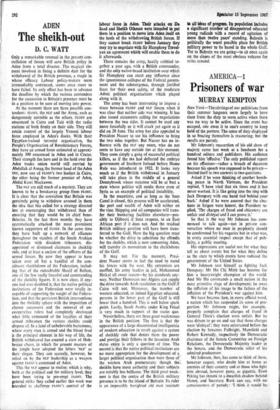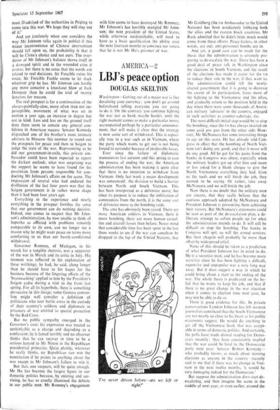Prisoners of war
AMERICA-1 MURRAY KEMPTON
New Yopk—The stirrings of our politicians from their summer languors seem largely to have risen from the duty to seem active when there was no way to be active. Since the event has escaped, one owes it to one's country to keep hold of the posture. The sense of duty displayed in so bracing themselves is reassuring; but the results are parody.
Mr Johnson's reassertion of his old show of majesty came last week at a luncheon for a hundred editors and publishers. His audience found him 'effusive.' The only published report on his effusions—rather a breach of decorum because his speech was supposed to be private— limited itself to two answers to two questions.
Asked if he were thinking of another bomb- ing pause in North Vietnam, the President replied, 'I have tried that six times and it has never worked. It is like going into the ring with Jack Dempsey with one hand tied behind your back.' Asked if he were assured that the elec- tions in Saigon were honest, the President re- plied, 'The charges of fraud and chicanery are unfair and disloyal and I can prove it.'
So that is the way Mr Johnson has com- menced to talk again—not in private con- versation where no man in perplexity should be condemned for his vagaries but in what was, in every essential respect except that of pub- licity, a public meeting.
His expressions are useful not for what they tell us about events but for what they define as the state to which events have reduced the government of the United. States.
Mr Johnson sees himself as fighting Jack Dempsey; Mr Ho Chi Minh has become for him a heavyweight champion of the world. And Mr Ho commands a small nation in the most primitive stage of development; he owes the inflation of his image to the failure of the inflation of the President's war against him.
We have become then, in every official word, a nation which has suspended its sense of pro- portion. Mr Johnson might, for example, properly complain that charges of fraud in General Thieu's election were unfair. But he was driven to go on and say that those charges were 'disloyal'; they were entertained before the election by Senators Fulbright, Mansfield and Robert Kennedy, respectively the Democratic chairman of the Senate Committee on Foreign Relations, the Democratic Majority leader in the Senate, and• the Democratic relict of his admired predecessor.
Mr Johnson, then, has come to think of these, however august, who doubt him at home as enemies of their country and at those who fight him abroad, however puny, as gigantic. Even Peking has shrunk to a dwarfish shadow behind Hanoi, and Secretary Rusk can say, with no consciousness of parody : 'I think it would be most ill-advised of the authorities in Peiping to come into this war. We hope they will stay out of it.'
And yet (curiously when one considers the way Mr Johnson talks again in public) if this minor inconvenience of Chinese intervention should fall upon us, the probability is that it will be China's choice and not ours. The over- throw of Mr Johnson's balance shows itself in a damaged spirit and in the wounded cries it evokes; but there is no sense that the words are related to real decisions. Sir Forcible raises his voice; Sir Forcible Feeble seems to let slack whatever grip he has. Mr Johnson can hardly any more conceive a knockout blow at Jack Dempsey than he could the trial of twenty Senators for treason.
The real prospect is for a continuation of the always-painfully-slow, more often than not im- perceptible, movement of what was set in motion a year ago, an increase in degree but not in kind. Less and less on the ground itself does there seem to remain any general con- fidence in American success. Senator Kennedy dispatched one of his brother's most intimate advisers to Moscow this summer to sound out the prospects for peace and then to Saigon to judge the state of the war. Representing as he did our government-in-exile, this private am- bassador could have been expected to report the darkest outlook; what was surprising was the support he seems to have found for his pessimism from persons responsible for con- ducting Mr Johnson's affairs on the scene. The impression of several who had endured the disillusion of the last four years was that the Saigon government is in rather worse shape than it had been four years ago.
Everything in the experience and nearly everything in the prospect fortifies the sense that our government can do nothing decisive. Indeed, one comes to suspect that Mr John- son's administration, by now unable to think of Superho afflicted with problems remotely comparable to its own, can no longer see a reason why he might want peace on terms more comforting to us than our barely-conditional withdrawal.
Governor Romney, of Michigan, in his search for a tangible rhetoric, was a supporter of the war in March and its critic in July. His torment was reflected in his explanation of these writhings; he had, he said, clung longer than he should have to his hopes for the business because of the lingering effects of the 'brainwashing' applied to him by the President's Saigon cadre during a visit to the front last spring. For all its hyperbole, there is something persuasive in this image; some Geneva conven- tion might well consider a definition of politicians who tour battle areas in the custody of their country's soldiers and diplomats as prisoners of war entitled to special protection by the Red Cross.
But no public sympathy emerged in the Governor's case; his expression was treated as unthinkable as a charge and degrading as a confession; he is lamed terribly and no observer thinks that he can recover in time to be a serious hazard to Mr Nixon in the Republican presidential primaries. Quite plainly, whatever he really thinks, no Republican can win the nomination if he points to anything about the war except to Mr Johnson's failure to win it.
But that, one suspects, will be quite enough. Mr Ho has become the largest figure in our domestic politics because, by existing and sur- viving, he has so cruelly illumined the defects in our public men. Mr Romney's engagement with him seems to have destroyed Mr Romney; Mr Johnson's has horribly mangled Mr John- son; the next president of the United States, while otherwise unidentifiable, will need to have as a basic qualification the ability over the next fourteen months to convince our voters that he is not Mr Ho's prisoner of war.































 Previous page
Previous page